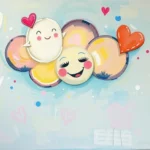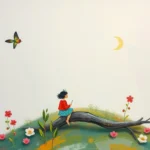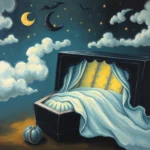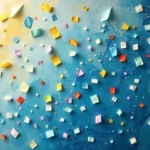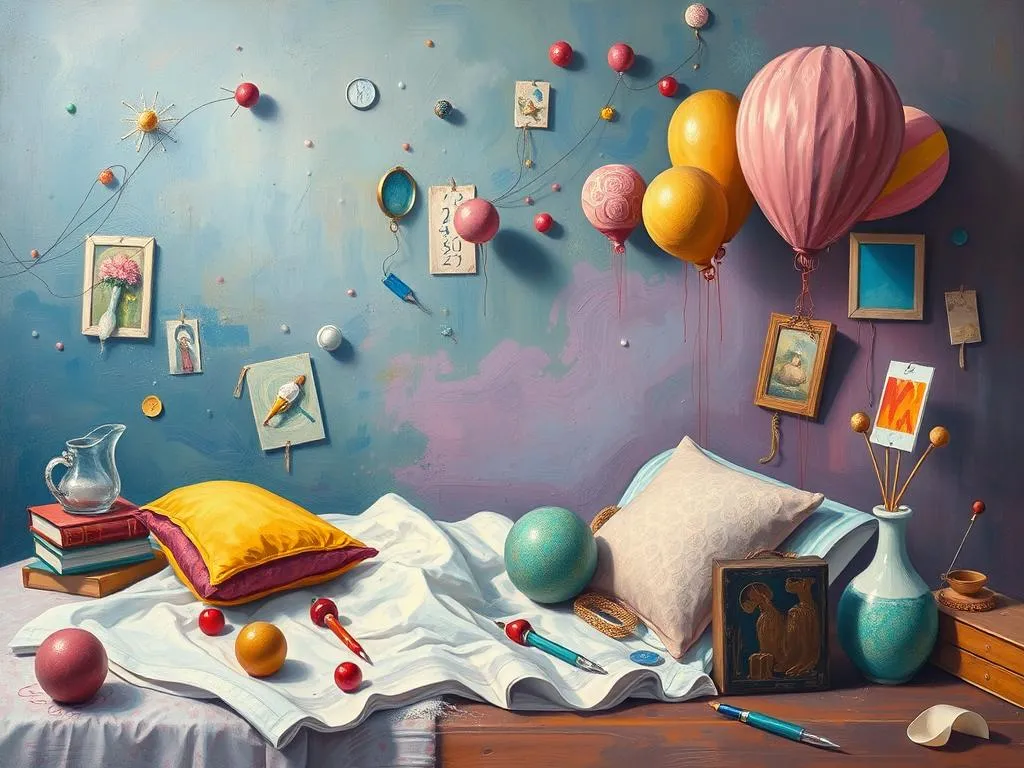
Dreams have long fascinated humanity, serving as a window into our subconscious minds. They often present us with a bizarre mix of ordinary objects, people, and situations that may seem random but hold significant meaning. The allure of deciphering these nocturnal messages lies not only in their peculiarity but also in their potential to reveal insights about our emotional state, unresolved issues, and desires. Understanding the significance of the seemingly random elements in our dreams can lead to profound personal revelations and self-awareness.
Symbolism and Meaning
When we encounter random stuff in our dreams, the first step in interpretation is to identify the symbols present. Each object or scenario can carry multiple meanings, often reflecting our personal experiences and emotions. For instance, dreaming about a broken clock may symbolize feelings of being stuck or the passage of time slipping away. Conversely, it could represent a desire to reconnect with the past or a warning about procrastination.
The presence of flying objects, like balloons or airplanes, often signifies a longing for freedom or escape from our daily grind. If these objects appear in chaotic or fragmented ways, they may indicate feelings of anxiety or loss of control in our waking life. On the other hand, dreaming of water, whether it be a tranquil lake or a turbulent ocean, can symbolize emotional depth and intuition. Calm water often reflects serenity and clarity, whereas rough waters may indicate emotional turmoil or uncertainty.
Objects that hold personal significance can also appear in dreams. A childhood toy, for example, might evoke nostalgia, suggesting a longing for simpler times or unresolved emotions from one’s upbringing. Alternatively, dreaming of a key can represent opportunity, access, or the unlocking of new aspects of one’s personality. Each individual’s interpretation can differ based on their unique life experiences, making it essential to approach dream analysis from a personal perspective.
While the mainstream interpretations of symbols provide a framework, it’s crucial to remember that these meanings can shift based on context. A random item in a dream may trigger specific memories or emotions for one person while representing something entirely different for another. This subjectivity is what makes dream interpretation both an art and a science; it requires a blend of analytical skills and intuitive understanding.
Key Scenarios and Variations
The interpretation of dreams filled with random elements can vary widely based on specific scenarios. For instance, if you dream of wandering through a cluttered room filled with strange objects, it may symbolize a sense of overwhelm in your waking life. You might feel burdened by responsibilities or emotions that need to be addressed. On the other hand, if you discover a hidden treasure among the clutter, this could signify the uncovering of hidden talents or unresolved issues that, once addressed, can lead to personal growth.
Another common scenario involves losing an item in a dream. Losing something random like a shoe or a book may represent feelings of insecurity or confusion. It could indicate a fear of losing something important in your life or signify that you are feeling ungrounded. If you find the lost item, it can imply that you are regaining control or clarity over a situation that has been troubling you.
Consider also the dream of encountering strange people in unusual settings. Meeting a group of random strangers at a familiar place can signify new opportunities or relationships on the horizon. However, if these encounters evoke fear or discomfort, it may reflect anxiety about social situations or a fear of the unknown. The emotional context is vital in determining the message your subconscious is trying to convey.
Variations in emotional tone can also significantly alter the interpretation. For instance, if you dream of floating through a dreamscape filled with bizarre items and feel a sense of joy and liberation, it could indicate that you are embracing change and letting go of restrictions. Conversely, if the dream is marked by confusion or fear while navigating this odd environment, it might suggest feelings of being lost or overwhelmed by external pressures.
Dreams can also incorporate themes of transformation or change. Imagine dreaming of random animal encounters, such as a lion in your living room or a butterfly in your bedroom. Animals often symbolize instincts and emotions. A lion might represent courage or assertiveness, urging you to confront challenges, while a butterfly could symbolize transformation and the potential for growth in your life. The random nature of these encounters may suggest that you are on the brink of a significant change or that your subconscious is nudging you toward self-discovery.
Real-Life Connections and Takeaways
Understanding the random elements in your dreams can foster valuable insights into your waking life. Dreams often serve as reflections of our feelings, challenges, and aspirations. By paying attention to the symbols and scenarios, you can gain a deeper understanding of your emotional landscape.
One practical approach is to keep a dream journal. Recording your dreams shortly after waking can help you capture those fleeting details and emotions. Over time, patterns may emerge, revealing recurring themes or symbols. Reflecting on these can lead to significant realizations about your current life situation, relationships, or personal growth.
Consider how the random objects or situations in your dreams connect to your daily life. For example, if you frequently dream about clutter, it may be worth examining your physical and emotional environment. Are there areas in your life that feel chaotic or overwhelming? Taking steps to declutter both your surroundings and your mind can lead to a more peaceful existence.
Engaging in self-reflection is also crucial. Ask yourself what specific emotions or thoughts arise when you think about the random elements in your dreams. For instance, if a broken mirror appears in your dream, consider what it might signify about your self-image or relationships with others. Mirrors often reflect our perceptions, and a broken mirror could symbolize distorted views of oneself or unresolved conflicts.
Moreover, embrace the idea of exploring new experiences. If your dreams feature random adventures or unusual activities, it may be a sign that your subconscious is urging you to step outside your comfort zone. Engaging in new hobbies, meeting new people, or simply trying different daily routines can invigorate your life and stimulate personal growth.
Finally, remember that dreams can serve as a tool for problem-solving. If you’re facing a dilemma or decision, your subconscious mind might present you with random scenarios that provide creative solutions or alternative perspectives. Consider reflecting on your dreams as a way to brainstorm ideas or insights about challenges you are currently navigating.
In conclusion, while the random elements in your dreams may seem trivial or nonsensical at first glance, they can hold profound significance when examined thoughtfully. By engaging with the underlying symbolism, exploring variations in scenarios, and connecting these dreams to real-life situations, you can uncover insights that lead to greater self-awareness and personal growth. Embrace the mystery of your dreams, and allow them to be a guiding force in your journey of self-discovery.


